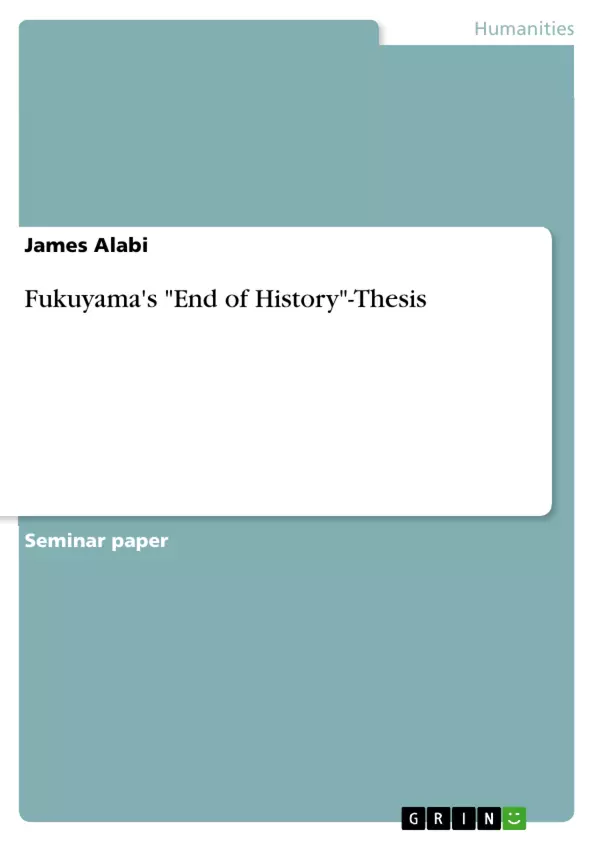Perhaps the most apt way to start is to hear Francis Fukuyama in his own words regarding the objective of his journey into the end of history thesis. With that, we would have been immediately, at least considerably, launched into the entire discourse and have a clear sense of direction altogether.
Fukuyama opens up the whole project of his thesis with a view not only to propagating the tenets of an ideology but also, and more fundamentally too, to order and put a seal to the views of his predecessors —Hegel and Marx —with whom he shares considerable degree of similar philosophical viewpoint vis-à-vis the journey of history and of the stages of evolution of human consciousness. Both Hegel and Marx had laid the foundation upon which Fukuyama would later build his theory of history and goal of its journey, or say development of human consciousness.
From this background, this paper sets to do an expose of Fukuyama’s philosophical standpoint on the concept of history, using as background Marxist dialectical master stroke as well as Hegel’s idealist ‘grundnorm,’ and do a critique of the entire thesis. The focus essentially here is to interrogate the multifarious philosophical implications of Fukuyama’s standpoint in relation to his declaration of the ‘end of history.’
Inhaltsverzeichnis (Table of Contents)
- INTRODUCTION
- Background to Fukuyama's Thesis
- The Man Fukuyama
- Fukuyama's 'End of History' Thesis
- On the conception of ‘History' in Fukuyama's Philosophy.
- 'End' as conceived in Fukuyama's philosophy....
- The Topos of Fukuyama's ‘End of History' Thesis
- Appraising Fukuyama's 'End of History' Thesis..
- Epistemological implication .………………..
- Ideological implication .........
- Political implication.......
Zielsetzung und Themenschwerpunkte (Objectives and Key Themes)
This paper aims to critically examine Francis Fukuyama's "End of History" thesis, evaluating its philosophical implications in light of its historical context and the influence of Hegel and Marx. The paper utilizes the framework of Marxist dialectical materialism and Hegel's idealist "grundnorm" to critically analyze Fukuyama's thesis.
- The historical context of Fukuyama's thesis and its relationship to the fall of Communism.
- The philosophical implications of Fukuyama's concept of "history" and its connection to Hegel and Marx.
- The role of consciousness in human affairs and its relationship to the "End of History" thesis.
- The epistemological, ideological, and political implications of Fukuyama's thesis.
- The potential limitations of Fukuyama's thesis and its relevance to contemporary political and social debates.
Zusammenfassung der Kapitel (Chapter Summaries)
- INTRODUCTION: This chapter introduces the reader to Fukuyama's "End of History" thesis by exploring his personal background and the historical context surrounding his work. It also sets the stage for the critical examination of the thesis that will follow.
- Background to Fukuyama's Thesis: This chapter delves into the historical and philosophical influences that shaped Fukuyama's thesis, highlighting the role of the fall of Communism and the end of the Cold War in his thinking. It also examines the influence of Hegelian and Marxist philosophies on Fukuyama's understanding of history.
- The Man Fukuyama: This chapter provides a brief biographical overview of Francis Fukuyama, highlighting his academic background, career, and key works. It examines his perspectives on global capitalism, Middle Eastern political-military affairs, and the foreign policy of the former Soviet Union.
- Fukuyama's 'End of History' Thesis: This chapter examines the core concepts of Fukuyama's thesis, exploring his definition of "history" and his argument that liberal democracy represents the end point of ideological evolution. It analyzes his views on the role of consciousness in human affairs and the triumph of liberal democracy over alternative systems of government.
Schlüsselwörter (Keywords)
This paper explores key concepts and topics including: Fukuyama's "End of History" thesis, liberal democracy, capitalism, communism, Hegel's "grundnorm," Marxist dialectical materialism, consciousness, ideological evolution, epistemology, ideology, politics, and the historical context of the fall of Communism.
- Arbeit zitieren
- James Alabi (Autor:in), 2018, Fukuyama's "End of History"-Thesis, München, GRIN Verlag, https://www.grin.com/document/435005



